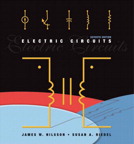Text:

Electric Circuits
Seventh Edition (2005)

w/PSpice
Susan Riedel
Pearson Prentice Hall
ISBN-10: 0131329723
ISBN-13: 9780131329720
About this book:
Cited by IEEE Spectrum as an "up and coming classic in the field of circuits,"Electric Circuits is the most widely used introductory circuits textbook. This revision of both text and robust supplements package features an increased emphasis on student and instructor assessment, a redesigned art program, a new four-color format, and abundant new or revised problems throughout. The Seventh Edition retains the goals that have made this text a best-seller: 1) to build an understanding of concepts and ideas explicitly in terms of previous learning; 2) to emphasize the relationship between conceptual understanding and problem solving approaches; 3) to provide students with a strong foundation of engineering practices.
For sophomore level, one- or two-semester Introductory Circuit Analysis or Circuit Theory Courses taught in Electrical or Computer Engineering Departments.
Text Website: http://www.prenhall.com/onekey